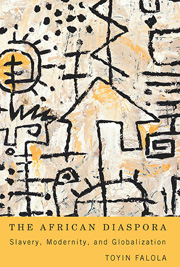Book contents
- Frontmatter
- Dedication
- Contents
- Preface and Acknowledgments
- Introduction: The Old and New African Diaspora
- Part 1 The Old Diaspora: Slavery and Identity Politics
- Part 2 An African Case Study: Yoruba Ethnicity in the Diaspora
- Part 3 The New Diaspora: Transnationalism and Globalization
- 8 Western Education and Transatlantic Connections
- 9 Africa in the Diaspora and the Diaspora in Africa: Toward an Integrated Body of Knowledge
- 10 Tanure Ojaide and Akin Ogundiran: Knowledge Circulation and the Diasporic Interface
- 11 Nollywood and the Creative World of Aderonke Adesola Adesanya: The African Impact on Global Cultures
- 12 Globalization and Contemporary Cultures
- Postscript: United States Foreign Policy on Africa in the Twenty-First Century
- Notes
- Bibliography
- Index
9 - Africa in the Diaspora and the Diaspora in Africa: Toward an Integrated Body of Knowledge
from Part 3 - The New Diaspora: Transnationalism and Globalization
Published online by Cambridge University Press: 05 September 2013
- Frontmatter
- Dedication
- Contents
- Preface and Acknowledgments
- Introduction: The Old and New African Diaspora
- Part 1 The Old Diaspora: Slavery and Identity Politics
- Part 2 An African Case Study: Yoruba Ethnicity in the Diaspora
- Part 3 The New Diaspora: Transnationalism and Globalization
- 8 Western Education and Transatlantic Connections
- 9 Africa in the Diaspora and the Diaspora in Africa: Toward an Integrated Body of Knowledge
- 10 Tanure Ojaide and Akin Ogundiran: Knowledge Circulation and the Diasporic Interface
- 11 Nollywood and the Creative World of Aderonke Adesola Adesanya: The African Impact on Global Cultures
- 12 Globalization and Contemporary Cultures
- Postscript: United States Foreign Policy on Africa in the Twenty-First Century
- Notes
- Bibliography
- Index
Summary
This chapter intends to complicate the motivations for writing about the African diaspora in order to suggest ways to integrate African and African diasporic histories and communities. Two bodies of knowledge that are treated as distinct and separate will be connected on the basis of themes around the notion of a diaspora connected with Africa. Some scholars regard the study of the African diaspora as a political project, an attempt to use knowledge for the purpose of uniting Africa with the black people scattered in Asia, Europe, and the Americas. From this perspective, the dominant issues relate to the marginalization of black people and the need to overcome it; Marcus Garvey and Kwame Nkrumah fall into this category. To these two and others, Africa has a relevance to the African diaspora, and the African diaspora has a relevance to Africa. They are twins, and knowledge about them can be integrated to achieve political purposes such as dismantling the colonial powers in Africa and attaining racial equality in the Americas.
Some intellectuals look at this subject strictly from an academic point of view. To this category of scholars, teaching diaspora history is similar to teaching world history, with the underlying assumption that Western civilization should not be the only or dominant point of interest. Among this second category are those who believe that an insertion of Africa and the slave trade into the long narrative of world history is enough, a sort of intellectual tokenism.
- Type
- Chapter
- Information
- The African DiasporaSlavery, Modernity, and Globalization, pp. 235 - 254Publisher: Boydell & BrewerPrint publication year: 2013



